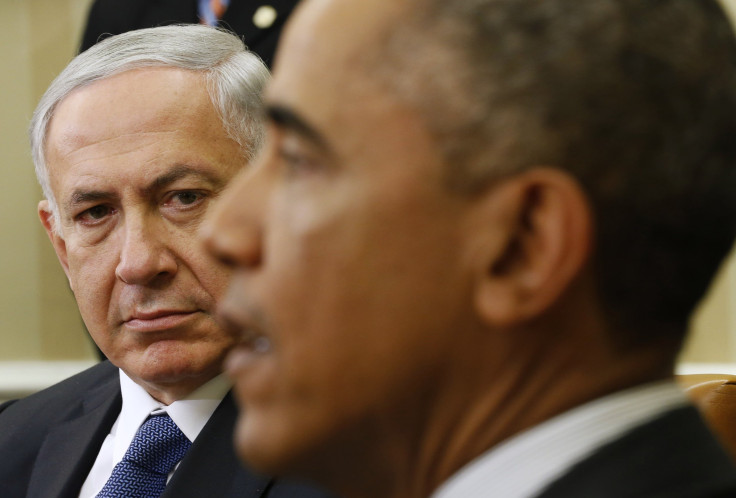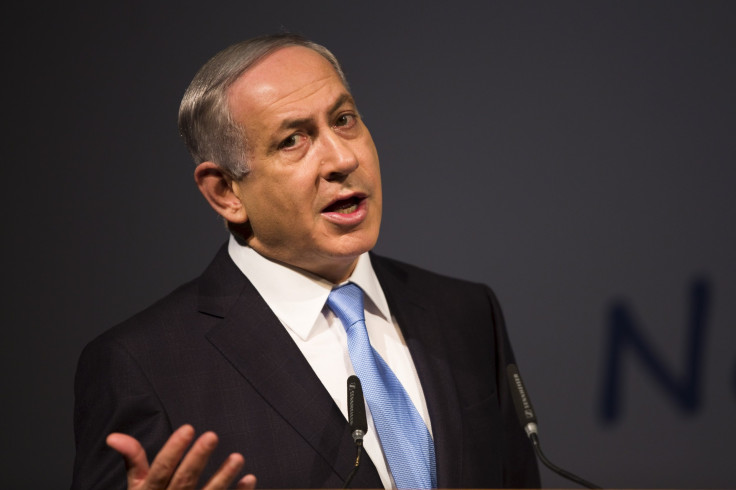President Obama and Israeli Prime Minister Netanyahu: It's 'All About The Money' As The Leaders Meet In Washington

When President Obama and Israeli Prime Minister Benjamin Netanyahu sat down to talk at the White House Monday, there was one topic that loomed above all others: Money. The two leaders, whose relationship has been characterized more by mistrust and misunderstandings than camaraderie and goodwill, met to defrost the froideur that has set in since the passage of the Iran nuclear deal -- which Netanyahu said would “change the Middle East for the worse” in his speech to Congress in March -- and agree the terms of expanding U.S. military aid to Israel.
President Obama is predicted to increase the 10-year, $30 billion aid package that was agreed to in 2007 under the Bush administration. That package is due to expire in 2018 but in his March 2013 visit to Israel, President Obama pledged to continue multi-year aid packages to Israel through 2028. While the White House has been coy about the expected terms of the deal, Israel is requesting that the U.S. increase its financial commitment by half, from $3 billion a year to around $4.5 billion.
“It’s been a difficult year for the U.S. and Israel,” said David Makovsky, an expert on U.S.-Israeli relations at the Washington Institute for Near East Policy, a think tank in Washington. “But Obama is not looking for further bruising battles [with Netanyahu]. He is keen on stabilizing the relationship.”
The likely increase in military aid, analysts say, does not come as a surprise. President Obama wrote letters to members of Congress to drum up support for the nuclear deal in which he committed to base-line support for Israel, as well as additional, targeted military aid packages.
“Our support for Israel is also an important element in deterring Iran from ever seeking a nuclear weapons. Throughout my time in office I have consistently viewed Israel’s security as sacrosanct,” Obama said in his letters to Congress. “My administration has pursued an unprecedented level of military, intelligence, and security cooperation with Israel.”
Obama said Congress would provide another $3.1 billion basic installment of foreign military financing for Israel, and the U.S. has already invested an additional $3 billion in the Iron Dome defense system that intercepts rockets aimed at the country as well as a $1.8 billion multiyear munitions resupply package.
The new memorandum on aid levels is likely to include new aircraft, Makovsky said. Last month, Defense Secretary Ashton Carter agreed on a procurement plan with Israeli Secretary of Defense Moshe Ya'Alon that included the acquisition of at least another squadron of F-35 fighter planes, the purchase of the V-22 tiltrotor aircraft, upgrading tunnel-locating technologies and progressing the fields of cyber warfare and precision weaponry.
It is to Israel's advantage, Makovsky suggested, that “the [Middle Eastern] region has deteriorated. There has been a meltdown of nation states around Israel and Iran now has more [money] at its disposal,” Makovsky said. “The extent of the increase of the figure in the memorandum will be based on a broader threat-based kind of assessment.”
But Netanyahu cannot expect to get everything he asks for, Philip Wilcox, a former U.S. diplomat in Jerusalem and president of the Foundation for Middle East Peace, told International Business Times.
“There will be some gestures and some substantial additions made in the U.S.-Israel security arrangement but it will not be as substantial as Israel would have hoped. I think there is reluctance in the White house to provide lavish new aid to Israel in the face of a relationship that is not a happy one, especially at a time of budget stringency.”

The military aid Obama has promised, though, will be delivered to Israel despite the Obama administration's outspoken criticism of Israeli settlements.
U.S. State Department spokesman John Kirby said Monday the administration would do anything it could to "move this process in the direction of the two state solution." But, he added, talks between the Palestinian leadership and the Israelis would not take place anytime soon. According to Malcolm Hoenlein, chief executive of the Conference of Presidents of Major American Jewish Organizations, interviewed in the New York Times, "[Obama] knows he’s not going to have a Palestinian state in his term, but he will help set the stage for it.”
For now, when it comes to Israel, the U.S. president is choosing to place defense above diplomacy. As he tweeted following Monday's meeting: “We have closer military and intelligence cooperation than any two administrations in history.”
© Copyright IBTimes 2024. All rights reserved.





















